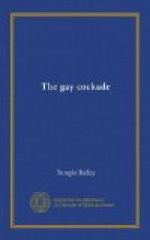It was in the middle of the following winter that I began to realize that Perry was not well. He had come home on a snowy night, tired and chilled to the bone. He was late and Rosalie had kept dinner waiting for him. It was a rather sorry affair when it was served. Perry pushed his chair back and did not eat. I had as little appetite for it as he, but I did my best. I had arrived on an earlier train, with some old prints that I wanted to show him. Rosalie and I looked at them after dinner, but Perry crouched over the fire and coughed at intervals.
At last I couldn’t stand it any longer.
“He needs some hot milk, a foot bath, and to be tucked up in bed.”
Rosalie stared at me above the prints. “Perry?”
“Yes. He isn’t well.”
“Don’t croak, Jim Crow.”
But I knew what I was talking about. “I am going to get him to bed. You can have the milk ready when I come down.”
It developed that there was no milk. I walked half a mile to a road house and brought back oysters and a bottle of cream. I cooked them myself in the white-tiled kitchen, and served them piping hot in a bowl with crackers.
Perry, propped up in bed, ate like a starved bird.
“I’ve never tasted anything better,” he said; and, warmed and fed, he slept after a bit as soundly as a satisfied baby.
It was while he was eating the oysters that Rosalie came to the door and looked at him. He was not an aesthetic object—I must admit that no sick man is—and I saw distaste in her glance, as if some dainty instinct in her shrank from the spectacle.
When I went down I found her sitting in front of the fire, wrapped in a Chinese robe of black and gold. You can imagine the effect of that with the red of her hair and the red of her cheeks and lips. Her feet, in black satin slippers, were on a jade-green cushion, and back of her head was the strip of brocade that she had bought with her housekeeping money. It was a gorgeous bit, repeating the color of the cushion, and with a touch of blue which matched her eyes.
She wanted me to show her the rest of the prints. I tried to talk to her of Perry’s health, but she wouldn’t.
“Don’t croak, Jim Crow,” she said again.
As I look back at the two of us by the fire that night I feel as one might who had been accessory to a crime. Rosalie’s charm was undoubted. Her quickness of mind, her gayety of spirit, her passion for all that was lovely in art and Nature—made her indescribably interesting. I stayed late. And not once, after my first attempt, did we speak of Perry.
II
It was in March that I made Perry see a doctor. “Nothing organic,” was Perry’s report. Beyond that he was silent. So I went to the doctor myself.
“What’s the matter with him?”
“He is not getting the proper nourishment,” the doctor told me. “He must have plenty of milk and eggs, and good red meat.”




